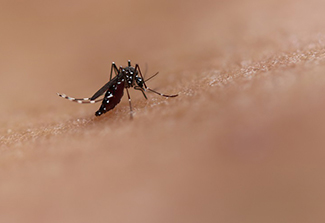FDA approves first chikungunya vaccine
January/February 2024 | Volume 23 Number 1
By Susan Scutti
 Photo courtesy of National Institute of Allergy and Infectious DiseasesAedes mosquitoes, like the one shown here, can be vectors for the virus which causes chikungunya.
Photo courtesy of National Institute of Allergy and Infectious DiseasesAedes mosquitoes, like the one shown here, can be vectors for the virus which causes chikungunya.
Ixchiq,
the world’s first chikungunya vaccine, was approved by the U.S. Food and Drug Administration on November 9, 2023. The WHO describes chikungunya as a disease that causes fever and severe joint pain, often debilitating and varied in duration. Chikungunya, which is transmitted to humans by mosquitoes primarily in tropical and subtropical regions of Africa and Asia, and parts of the Americas, may also trigger joint swelling, muscle pain, headache, nausea, fatigue and rash.
Ixchiq, also known as VLA1553, is produced by Valneva Austria GmbH, a specialty vaccine company based in Vienna, Austria.
“This virus can cause extensive outbreaks and significant morbidity,” Dr. Lesia K. Dropulic, Branch Chief, Clinical Trials Program, Vaccine Research Center (VRC) at the National Institute of Allergy and Infectious Diseases, told Fogarty. “The ability to prevent this, especially in parts of the world where the virus spreads endemically, is an important contribution to global public health.”
FDA approval of Ixchiq is based on Phase 3 clinical trial data in 4,115 adults “showing a 98.9% seroresponse rate at 28 days with a single vaccination,” according to Valneva. (In Phase 3 clinical trials a drug or vaccine is tested for efficacy and side effects; "seroresponse rate" is the percentage of people whose blood serum shows a developing antibody response capable of preventing infection.)
Ixchiq, which contains a live, weakened version of the chikungunya virus, is approved for individuals 18 years and older who are at increased risk of exposure to the virus, the FDA stated. Ixchiq is a single shot vaccine, injected into the muscle, that can cause symptoms similar to a chikungunya infection. Severe reactions occurred in 1.6% of recipients; some participants had prolonged adverse reactions that lasted for at least 30 days. The FDA requires that the company conducts a postmarketing study to assess the risk of adverse reactions. Prescribing information warns clinicians that it is unknown whether giving the shot to pregnant women can cause adverse effects in newborns.
Valneva, which develops, manufactures, and commercializes vaccines addressing unmet medical needs, reported that the vaccine is currently under accelerated assessment by the European Medicines Agency (EMA), while a standard regulatory review is underway with Health Canada. “To make VLA1553 more accessible to low- and middle-income countries, Valneva and Instituto Butantan in Brazil signed an agreement in January 2021 for the development, manufacturing and marketing of VLA1553,” the company stated. In addition to Ixchiq, Valneva’s pipeline includes a Lyme disease vaccine candidate in advanced clinical development (in partnership with Pfizer), and vaccine candidates against the Zika virus and other global public health threats.
Dropulic noted that, previously, the Vaccine Research Center had worked on a separate chikungunya vaccine. “The VRC developed a viral like particle (VLP) vaccine that we evaluated in Phase 1 and Phase 2 trials during the 2015 outbreak in the Caribbean.” Denmark-based Bavarian Nordic is now advancing the clinical development of this product, known as CHIKV VLP. Currently in Phase 3 trials, CHIKV VLP has demonstrated a high seroresponse rate and fast onset of response, according to Bavarian Nordic, which plans to submit to regulatory authorities this year. The FDA has granted CHIKV VLP its Breakthrough Therapy and Fast Track designations, which are intended to expedite the development and review of drugs, while the EMA has given the vaccine its PRIME designation, an accelerated assessment scheme for drugs targeting unmet needs. Bavarian Nordic has also developed smallpox and mpox vaccines through a partnership with the U.S. Government in addition to its portfolio of vaccines for travelers and endemic diseases.
Chikungunya was first identified in the United Republic of Tanzania in 1952 and subsequently in other countries in Africa and Asia, according to the WHO. Since 2004, the virus has been identified in over 110 countries in Asia, Africa, Europe and the Americas, while outbreaks have become more frequent and widespread. The FDA considers chikungunya an emerging global health threat with at least 5 million cases reported over the past 15 years.
More Information
Updated February 13, 2024
To view Adobe PDF files,
download current, free accessible plug-ins from Adobe's website.
Related World Regions / Countries
Related Global Health Research Topics